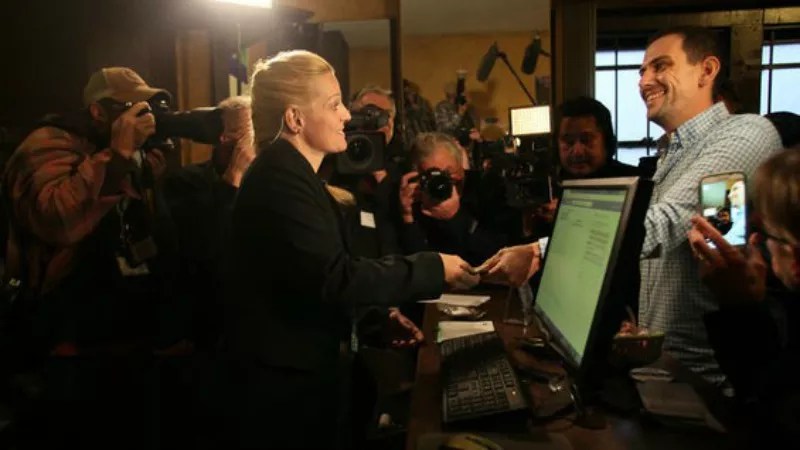
Brandon Marshall

Audio By Carbonatix
Who wants the first recreational cannabis purchase ever made? It’s sitting in Sean Azzariti’s closet. Grab a display case and it’s yours.
Azzariti made history just over a decade ago when he made the first-ever adult-use cannabis purchase on January 1, 2014, in Denver. Surrounded by cameras, news crews and his mother (that’s her holding the phone right under Azzariti at the bottom), the former Marine and legalization activist bought an eighth of Bubba Kush and a THC-infused chocolate truffle from Toni Savage Fox at 3D Cannabis Center on Brighton Boulevard.
3D Cannabis has since been bought and sold twice over, though all of the iterations have kept “3D” in front of their names to honor the landmark, which once was the biggest draw on a dry, dusty street that’s now the heart of a busy neighborhood anchored by Mission Ballroom. Over the past decade, thousands of cannabis dispensaries, cultivations, extraction labs and other businesses have come to Colorado as part of the green rush, and over twenty other states have followed our lead in legalizing recreational pot sales.
All while that eighth of Bubba Kush continues to cure.
“I can’t give it away. I don’t know what to do with it,” Azzariti laments. “I’ve tried to give it to so many people and museums. I feel like this is the equivalent to the first bottle of alcohol sold after Prohibition, yet it’s still sitting in my closet, in the same bag I bought it in.”
Michigan Governor William Comstock bought the first bottle of legal whiskey in the United States after Prohibition ended in December 1933. We couldn’t determine what happened to that bottle, but Americans were pretty thirsty for hooch back then, so there’s a good chance it was used for its intended purpose.
Still, that doesn’t negate Azzariti’s point: He and Savage Fox helped drive the final spike into the recreational cannabis tracks when the transaction was made. That ten-year-old weed should be in a museum somewhere. If a provincial parliament in Canada can encase a hamburger in plastic as an item of historical significance, Colorado can surely display the first legal weed purchase. After all, Denver was also home to the country’s first arrests under federal marijuana prohibition in 1937, so it’s not like we don’t have a hook.
And based on the way our state’s cannabis scene has morphed since Azzariti made the purchase, that bag is basically an artifact.
As Colorado turns the corner on a second decade of recreational cannabis sales, the quality of cannabis and ethos of the people selling it has changed a lot, according to Azzariti. Previously a cannabis extractor and now a chemist for a cannabis testing lab, he’s seen the evolution firsthand.
“Ten years ago, you could go into most dispensaries and find great weed, whereas now you have to search for about three or four brands that you think are the best. There really aren’t a lot of recreational brands that are reliable, and if you do find anything good, it’s $80 or $90 a quarter-ounce,” he says. “Working at a testing facility has given me a lot of insight. There are still a lot of people who believe in Colorado’s cannabis industry, but it’s just got beaten out of them.”
Colorado dispensaries have sold nearly $15.4 billion worth of cannabis products since 2014, according to the state Department of Revenue, which has tallied over $2.6 billion in marijuana tax revenue, as well. But cannabis prices, sales and business licenses have fallen off heavily since 2022, according to DOR data. Consolidation and a market retraction were inevitable as other states legalized commercial cannabis, though the COVID-19 pandemic likely postponed that decline.
Azzariti, well aware that cannabis businesses are no longer printing money, is more concerned about the soul of Colorado pot. “If you want to make good money in the cannabis industry right now, you have to go to other states. That’s just how it is,” he says. “I think other states can use Colorado as an example for things to do correctly and things not to do correctly. Overall, I think we did a pretty good job. The biggest hangup was not giving people a place to consume the thing we just legalized, and here we are ten years later and it still hasn’t resolved itself.”
Cannabis hospitality has moved at a snail’s pace in Colorado since 2014; fewer than half of the state’s municipalities opted in to allow sales, and fewer than ten lounges and mobile lounges are operating across the state. But even with the lack of places to socially consume cannabis, Azzariti knows how much work it took to get to this point. The plant was always more to him than a photo or business opportunity, he says, pointing to daily medical marijuana use as a way to treat his post-traumatic stress after military service.
“Life has been good, and living in Denver is still great. You don’t see a lot of people moving here for the cannabis industry anymore, and I just want to see the cannabis industry thrive the way I know it can,” he adds. “We’re all just sort of in it now, and we’re not fighting for things as much anymore. It’s more nitpicking and staying the course.”
Change comes quickly in retail cannabis, and normal business developments are boring in comparison to the early days of legalization, when more risk, attention and discovery were involved.
Good thing Azzariti’s receipt is laminated.